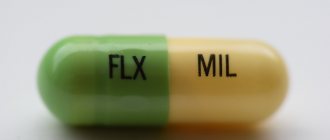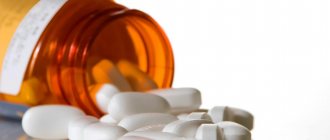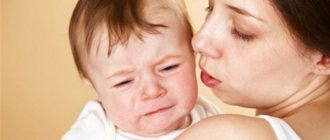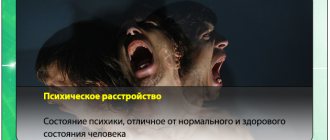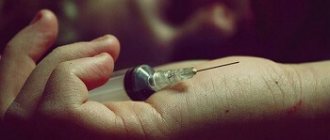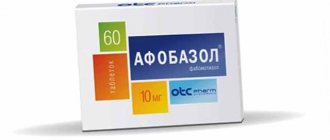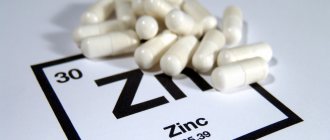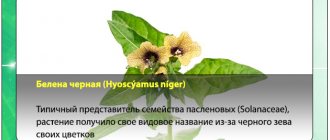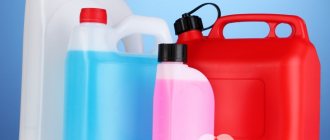Ascorutin belongs to the category of one of the simplest vitamin complexes that are prescribed even to teenagers.
It is readily used to help cure various ailments. But such a wide range of applications also has one significant drawback. People are accustomed to buying such pills without first consulting a doctor. Patients use them without supervision from a specialist, which often provokes an allergic reaction. And in the worst case scenario, an overdose of ascorutin is the logical conclusion of self-medication.
Overdose of Ascorutin: symptoms, first aid and treatment
A condition caused by an overdose of Ascorutin can cause serious disruption in the functioning of the body.
To avoid unpleasant consequences, you need to take the drug strictly following the instructions.
If the victim has severe symptoms of an overdose, then he needs to be provided with emergency assistance. We will tell you here and now what needs to be done in case of an overdose of Ascorutin.
Basic information
Ascorutin is a drug consisting of a combination of ascorbic acid and vitamin P (rutoside). The latter enhances the antioxidant effect of vitamin C and promotes its accumulation in the body. The components are active participants in all metabolic processes, reduce capillary fragility, vascular wall permeability, enhance microcirculation, and stimulate the production of hormones.
Note: the benefits of Ascorutin are that it increases local and general immunity, removes toxins and waste, blocks local inflammatory reactions in blood vessels, has a beneficial effect on heart function, and inhibits the development of diabetic retinopathy. Harm from Ascorutin appears only when the recommended dose is exceeded and the instructions are not followed (section “contraindications”).
In what cases is the drug prescribed?
Ascorutin is recommended for the treatment and prevention of hypovitaminosis C and P, correction of microcirculatory lesions. In addition, the drug is used in the complex treatment of diseases accompanied by impaired permeability of the vascular wall, hemorrhages in the retina and frequent nosebleeds:
- thrombocytopenic purpura,
- radiation sickness,
- endocardial damage
- rheumatism,
- glomerulonephritis,
- allergic vasculitis,
- childhood infections,
- typhus, etc.
Dosage regimen and course duration
Tablets are taken orally, 1 pc. 2–3 times a day. The duration of treatment depends on the severity of clinical signs, on average 1 month.
What happens if you eat a lot of Ascorutin? The drug cannot be abused, since ascorbic acid is deposited in a kind of depot, resulting in the formation of excess vitamin C. With a single use of 10 or more tablets, an overdose of Ascorutin may develop, requiring urgent medical intervention.
Contraindications
Ascorutin should not be used by people suffering from the following diseases:
- allergy to Ascorutin,
- thrombophlebitis,
- tendency to vascular thrombosis,
- other conditions accompanied by increased blood clotting,
- renal failure (acute/chronic form),
- urolithiasis disease,
- gout,
- decreased potassium levels in the blood (hypokalemia),
- increase in calcium concentration (hypercalcemia).
Pregnant, lactating women and children should take Ascorutin with caution.
Compatibility of Ascorutin with other pharmaceuticals
| Product name | Reaction |
| Acetylsalicylic acid (Aspirin) and oral contraceptives | Slow down the rate of absorption of Ascorutin in the digestive tract |
| Penicillin and iron | Accelerating absorption and increasing the clinical effect of these drugs |
| Heparin and other anticoagulants | Reduced effectiveness due to vitamin C |
| Salicylates and Tetracycline | An increase in the volume of active substances in the blood serum and, as a result, an increase in the risk of side effects |
| Nonsteroidal anti-inflammatory drugs (NSAIDs) and antihypertensive drugs | A number of negative reactions may develop, so long-term simultaneous use of these drugs requires careful monitoring by the attending physician. |
Advice: the combined use of Ascorutin and medications containing ethyl alcohol is not recommended by the vast majority of experts. To avoid a possible threat to your health and life, it is better to abstain from alcohol for the entire period of treatment.
Side effects of Ascorutin
The list of negative consequences of taking Ascorutin is relatively small:
- allergic reactions,
- dyspeptic syndrome (nausea, vomiting, diarrhea),
- headache.
Other manifestations are purely individual and occur very rarely.
Symptoms of an overdose of Ascorutin
An alarming clinical picture appears literally in the first hours after taking a critical dose. This:
- acute epigastric pain (in the stomach area),
- nausea and vomiting,
- loose stools, diarrhea,
- hives,
- dizziness and headache,
- tachycardia (fast pulse),
- hypertension (high blood pressure),
- excitement and irritability, subsequently turning into drowsiness and apathy.
First aid
- The speed of providing emergency assistance to the victim depends on his health and life. Therefore, first of all you need to call a doctor. Before his arrival, take a number of emergency measures:
- Gastric lavage.
The victim needs to drink 2-3 glasses of water at room temperature and induce vomiting by pressing on the root of the tongue. The procedure for cleansing the stomach is carried out several times until clean rinsing water appears. - Application of sorbents.
Such drugs bind and remove toxic metabolic products. Most often used:
- Activated carbon,
- White coal,
- Polyphepan,
- Polysorb,
- Whitesorb,
- Enterosgel,
- Phosphalugel,
- Bifiform.
- Abundant drinking regime. Liquid entering the body in large quantities is excreted through the kidneys, simultaneously washing out toxins from them.
Note: if an overdose of Ascorutin occurs, then it is best to drink alkaline mineral water, because it slows down the absorption of the drug in the small intestine, and therefore alleviates the severity of the victim’s condition.
Treatment
A specific antidote (antidote) for Ascorutin poisoning has not been developed. To some extent it may be mineral water. To eliminate the clinical manifestations of overdose, symptomatic therapy is used.
In some cases, when the patient’s condition gives rise to serious concerns, detoxification of the body is carried out - infusion of a large volume of liquids. Antihistamine treatment of allergic manifestations of overdose is prescribed. If it is ineffective, steroid (hormonal) therapy is indicated.
To eliminate negative gastrointestinal symptoms, enterosorbents, antispasmodics, antiemetics and antidiarrheals are recommended for use.
Possible consequences
Why is Ascorutin dangerous? Acute poisoning (use of more than 3 g of the drug per day) entails severe impairment of kidney function (acute failure), the development of alkalosis, acidosis and hemolytic anemia.
Prevention
The most common cause of an overdose of vitamins is their uncontrolled use. In adults, clinical signs of poisoning develop due to multiple excesses of the daily norm.
Overdose of Ascorutin in children occurs for the same reason. The pleasant taste of the tablets provokes the child to eat too many of them.
Therefore, the medicine must be stored out of the reach of children and its irrational use must be prevented.
Despite the fact that Ascorutin is freely available in pharmacies, consultation with a specialist before using it is strictly required. This simple and important condition will allow you to avoid overdose not only of this, but also of other drugs.
Source: https://fr-dc.ru/otravlenie/chto-delat-pri-peredozirovka-askorutinom
Dosage
Children over 1 year of age can take Ascorutin with the permission of a doctor, but the dosage should not be exceeded. Vitamins are not candy; make sure your child doesn’t eat too many tablets.
It is also important to consider the criteria for preventive and therapeutic purposes. The instructions included with the tablets can give an accurate idea of what dosage a child of a certain age needs.
However, you should exclude attempts at self-medication, preferring professional consultation with a pediatrician.
- For children 3-12 years old, given the preventive nature of the measures, the instructions recommend taking ½ or a whole tablet every 24 hours. Complex treatment accepts the indicated dosage with an increase in the frequency of administration to 3 times a day.
- For a child over 12 years of age, it is recommended to take up to two tablets at a time for prevention; for treatment, you can take the same dosage, but three times during the day.
It is recommended to take the tableted drug only with purified water and take it orally after meals. The instructions recommend a treatment duration of no more than 3 weeks. Depending on individual needs and specialist recommendations, the course can be extended and the dosage adjusted.
What to do in case of overdose (poisoning) of Ascorutin for adults and children
Category: Drug poisoning
Ascorutin is a simple vitamin complex prescribed to children and adolescents. Widely used for complementary therapy of various diseases. Despite such a wide range of applications, the drug has a drawback, since an overdose of ascorutin is possible.
What it is? What are the causes and symptoms of the appearance? How to provide first aid correctly?
About the drug
Ascorutin is a complex of vitamins that is sold in pharmacies without a doctor's prescription. Available in tablet form, 10, 18 and 50 pieces. They have a green color.
Composition of Ascorutin:
- Vitamin C or ascorbic acid - normalizes metabolism and redox reactions. Participates in the production of collagen, which has a beneficial effect on the condition of the epidermis, nails, hair, cartilage and bone tissue. Protects the immune system from viruses, bacteria and other pathogenic microflora.
- Rutin or vitamin P has a beneficial effect on the condition of blood vessels and the functioning of the heart muscle. Relieves inflammatory processes that occur in the human body.
Taking Ascorutin without medical supervision will lead to serious consequences.
Purpose:
- With vitamin deficiency. When there is a lack of nutrients in the body, pathological processes form: loss of elasticity of blood vessels, nails break, hair falls out, and the elasticity of the skin decreases;
- Weak immunity during epidemics of viral and bacterial diseases;
- Tendency to bruise;
- Additional vitamin therapy for acute respiratory viral infections, acute respiratory infections, the drug accelerates the human recovery process.
Contraindications for ascorutin:
- Individual intolerance to active substances.
- Manifestation of an allergic reaction.
- Thick blood, increased risk of blood clots.
- A metabolic disorder resulting in uric acid salts being deposited in the joints (gout).
- Presence of stone formations in the kidneys.
- Low potassium concentration in the blood.
- High calcium levels in the blood.
- Renal failure of chronic, acute form.
A person takes vitamins for preventive purposes.
Ascorutin does not belong to the complexes that are allowed to be used without the supervision of a specialist.
Causes and symptoms of overdose
An overdose of ascorutin occurs due to improper administration of the drug. Trying to speed up the healing process, a person takes an increased dose of vitamins, which exceeds the daily requirement by 2-3 times.
The first symptoms of an overdose of Ascorutin appear 60 minutes after exceeding the specified norm. The cardiovascular system and gastrointestinal tract are negatively affected. Dangerous are acute allergic reactions that develop in 2-3 minutes. As a result, anaphylactic shock or Quincke's edema is possible.
Symptoms of ascorutin overdose:
- sharp, aching pain in the epigastric region;
- feeling of nausea;
- vomit with drug residues;
- loss of stool (diarrhea);
- itchy sensation on the skin;
- allergic rashes all over the body, urticaria;
- agitated behavior;
- excessive irritability;
- pain and dizziness;
- high blood pressure;
- cardiopalmus.
The patient's advanced condition is accompanied by severe weakness and drowsiness. Additionally, anemia appears associated with a disruption of the life cycle of red blood cells, that is, the rate of destruction of blood cells increases than their maturation. Deviation from the norm negatively affects the excretory system due to disturbances in the acid-base balance.
https://www.youtube.com/watch?v=-ZjCxL8ByM0
If you receive an overdose of Ascorutin, regardless of the degree, you must consult a specialist to eliminate signs of intoxication. If you do not respond to the message in a timely manner, then the risk of kidney problems and loss of consciousness increases.
Overdose in children
In a child, the main reason for the appearance of signs of poisoning is the lack of parental control. Most mothers and fathers give vitamins to children like candy, not paying attention to all the warnings of experts.
Children can become poisoned by the vitamin complex if they take out a first aid kit with medications and eat all the Ascorutin granules in one go.
Important! If there are small children in the house, it is recommended to remove pharmaceutical products as high as possible. Otherwise, negligence can lead to severe poisoning or death.
For children, an overdose of Ascorutin leads to dysfunction of the kidneys, pancreas, and increases blood pressure.
Complaints during intoxication:
- Severe pain in the head.
- Nausea, vomiting.
- Stool falling off.
- Disturbed sleep, irritation of the central nervous system is observed.
First aid is to give activated carbon, and in case of severe poisoning with Ascorutin, you must call an ambulance. Self-medication is not recommended so as not to worsen the baby’s condition.
What to do if you are poisoned by a drug
A detected overdose of ascorutin requires immediate attention to specialists. They necessarily conduct an initial examination, collect tests and prescribe treatment.
Set of actions:
- provoke vomiting. It is enough to press on the root of the tongue after drinking 250-500 ml of warm liquid;
- give the patient activated carbon (1 tablet is used per 10 kg) or any other sorbent “Enterosgel”, “Polysorb”, etc.;
- lay the patient on a flat surface;
- ventilate the room until the ambulance arrives.
In case of an overdose of Ascorutin, you are also allowed to drink a laxative. For severe pain, take painkillers. Antidiarrheal compounds cannot be used. Their principle of action delays the withdrawal of Ascorutin, promoting greater absorption through the intestinal tract.
Treatment methods for poisoning
After providing medical care, it is important to hospitalize an adult or child in a hospital. The patient must be under strict supervision of nurses and doctors. What methods are used in hospitals to remove excess Ascorutin from the body?
Treatment method:
- A drip with saline solution is installed and glucose is added.
- Additionally, medications are prescribed that improve blood circulation in the body.
- As prescribed by the doctor, anticoagulants and thrombolytic compounds are added to therapy.
Forced diuresis helps eliminate excess Ascorutin from the body. This technique allows you to get rid of intoxication by releasing large amounts of urine. If there is no result from the treatment, the patient is sent to an extrarenal blood purification method.
The duration of therapy and recovery of the body from an overdose of Ascorutin varies from 2 to 4 weeks, depending on the severity of the patient.
Consequences
Can there be negative consequences from an overdose of Ascorutin? Of course yes. The resulting result from excessive use depends on several factors: the patient’s health status, the level of the body’s susceptibility and adaptive reactions.
Poisoning leads to:
- To the appearance of irreversible consequences in the work of the central nervous and excretory systems.
- The formation of a large number of blood clots.
- Neurological disorders.
- Gastric ulcer.
- Pancreatic dysfunction.
In childhood, tooth enamel is considered vulnerable, the risk of caries and lack of vitamin B 12 increases. An overdose of Ascorutin is possible if the vitamin complex is used incorrectly. You cannot prescribe the drug yourself, without consulting a doctor.
: askorutin is the strongest cheap pharmaceutical remedy
Source: https://otravlen.info/otravlenie-lekarstvami/peredozirovka-askorutinom.html
Side effects of Ascorutin
Lack of vitamins in the human body in the modern world is observed quite often. You can replenish the lack of ascorbic acid (vitamin C) and rutin (vitamin P) using the combined fortified drug Ascorutin.
Side effects of Ascorutin are observed quite rarely, but the benefits cannot be overestimated.
Effect of the drug
Ascorutin refers to capillary-stabilizing (capillary-protective) drugs containing in one tablet of a greenish or yellowish tint:
- ascorbic acid (vitamin C) – 50 mg;
- rutin (rutoside) – 50 mg.
In addition to vitamins, tablets are made with additional ingredients: sugar, potato starch, calcium stearate, talc.
Ascorutin is produced by many pharmaceutical companies in the former Soviet Union in tablet form
The beneficial properties of a drug are determined by its active components.
Ascorbic acid (vitamin C) is vital for human health, but is not produced by the body, but enters it with plant foods.
Vitamin C:
- prevents fragility and fragility of blood vessels, strengthens them and makes them more elastic;
- is a participant in hematopoiesis. Promotes normal absorption of iron;
- exhibits antioxidant properties;
- improves the condition of the immune system, which prevents the emergence and development of bacteria, viruses, and various infections. Is indispensable for colds and fever;
- participates in the metabolic process;
- helps increase skin turgor at the cellular level by participating in collagen production;
- has a beneficial effect on the nervous system;
- removes cholesterol from the body;
- has an anti-inflammatory effect;
- has a regenerating effect, promotes rapid healing of skin damage, etc.
A lack of vitamin C in the body is fraught with:
- a decrease in the body’s defenses and, as a result, colds and viral diseases;
- increased fatigue, irritability, lethargy, fatigue, depression;
- scurvy;
- bleeding from the gums;
- deterioration of the condition of the skin, hair, and cartilage tissue;
- premature aging, etc.
Vitamin P is also not produced by the body, but is found in foods of plant origin. Rutin is a natural compound that combines a group of flavonoids.
Vitamin P:
- helps better absorption of ascorbic acid, participates in the production of vitamin E;
- normalizes metabolism;
- thins the blood;
- increases the elasticity and strength of blood vessels;
- helps normalize blood pressure;
- has a regenerating effect;
- participates in the production of collagen, which leads to a rejuvenating effect;
- prevents varicose veins, spontaneous bleeding, and the appearance of cellulite;
- participates in the formation of bile and the regulation of daily urination;
- has an anti-edematous and analgesic effect;
- fights allergies;
- acts as an antioxidant defense for the body from external negative factors;
- Boosts immunity and more.
Lack of routine manifests itself:
- fragility of capillaries in the form of: subcutaneous pinpoint hemorrhages, small bruises;
- pain in the lower extremities;
- general weakness, malaise, fatigue, decreased performance.
These symptoms are most often observed in the autumn-winter period, in the absence of fresh vegetables, fruits and berries in the diet.
Ascorutin has a pronounced strengthening effect on the smallest vessels - capillaries
Ascorutin is prescribed:
You can also read: The best medicines for blood vessels
- in case of deficiency of ascorbic acid and vitamin P in the body;
- capillary pathologies caused by the use of medications containing salicylic acid and drugs that lead to a decrease in blood clotting (indirect coagulants);
- hemorrhagic diathesis – pathologies accompanied by bleeding and hemorrhage. The effect of the drug manifests itself mainly in cases of impaired capillary permeability (capillary toxicosis or Henoch-Schönlein disease), as well as a decrease in platelets in the blood (thrombocytopenic purpura);
- hemorrhage into the tissue of the eyes;
- radiation sickness, accompanied by damage to the vascular walls;
- infectious and infectious-allergic heart diseases (septic endocarditis, rheumatism);
- glomerulonephritis;
- arachnoiditis;
- allergies;
- infectious diseases that cause damage to capillaries (measles, scarlet fever, typhus, influenza);
- hypertension.
The drug is also able to eliminate nosebleeds caused by fragility of blood vessels.
Side effects
Sometimes the drug can affect:
- Central nervous system. Long-term use of the drug is fraught with headaches, increased fatigue, tiredness, drowsiness during the day and insomnia at night. These undesirable manifestations are caused by ascorbic acid, they disappear after discontinuation of the drug.
- Gastrointestinal tract. The presence of vitamin C in tablets has an irritating effect on the inner layer of the stomach, which leads to spasms of the smooth muscles of the organ and, as a result, nausea, vomiting, pain, and heartburn. Diarrhea is possible.
- Endocrine system and metabolism. The diabetogenic effect inherent in vitamin C makes it undesirable to use the medicine if there is a lack of insulin. In some cases, it is possible to use Ascorutin in a minimal dosage with constant monitoring of glucose levels in the diabetic’s body. By causing disruptions in salt metabolism, the drug can lead to the formation of oxalate stones in the urinary system. In addition, it is also undesirable for gout. Tumors of a malignant nature, which are characterized by rapid growth, or metastases begin to progress faster when consuming Ascorutin due to the effect of vitamin C on their cellular metabolism.
- Cardiovascular system. Taking the drug in large quantities can cause arterial hypertension. With blood clots in the vessels, they may break off with subsequent adverse consequences.
Side effects of Ascorutin are very rare
The use of Ascorutin can lead to allergic reactions manifested by skin rash, urticaria (itchy blisters), Quincke's edema (causing swelling of the larynx, pharynx, trachea), as well as anaphylactic shock.
Reviews
Lidiya Vasilievna, general practitioner, Moscow I prescribe Ascorutin depending on the patient’s health condition.
If no pathologies are identified, but the person is systematically susceptible to colds and viral diseases, he feels a constant feeling of weakness. This is a direct indication for prescribing the drug.
It has proven itself well, is suitable for almost all categories of patients, when used correctly, causes virtually no side effects and is affordable.
Igor, 38 years old, builder, Belgorod With the beginning of autumn I start to get sick. Working outdoors, I constantly catch colds. It is undesirable to take sick leave due to a severe loss in wages. Mom suggested taking Ascorutin.
At first nothing, but after a week small blisters appeared that were very itchy. He did not in any way connect their occurrence with taking the medicine, and began to get rid of the rash with all kinds of ointments. As a result, I had to see a doctor. It turned out that these manifestations are one of the side effects of the drug.
As soon as I stopped taking Ascorutin, the rashes disappeared.
Svetlana, 32 years old, housewife, Perm We have two children in our family – 5 and 8 years old. The older one has constant nosebleeds even when the weather changes, not just from blows. I started taking Ascorutin tablets twice a day. After a week the bleeding became less. And after the course of treatment (a month) they disappeared completely.
In addition, I give my kids pills in the fall to prevent colds and flu. The children practically do not get sick, are active, and do well at school. There are no side effects. I am very grateful to the drug. I am a supporter of healthy eating and in the summer I try not to feed the children pills, but provide them with a healthy diet.
Elena, 25 years old, young mother, Pskov The pregnancy was very difficult: swelling, varicose veins, symptoms of hemorrhoids, constant threat of failure. She took a huge amount of medications.
In the middle of pregnancy, the gynecologist prescribed Ascorutin. At first I was skeptical. But over time, the drug was appreciated.
The unpleasant symptoms gradually decreased, the birth went well, and the baby was born healthy.
Source: https://icvtormet.ru/medicamenty/pobochnye-effekty-askorutina
In what cases can you get an overdose of ascorutin?
Ascorutin is a vitamin preparation that compensates for the lack of elements in the human body. Can be prescribed for complex treatment of diseases. Overdose occurs due to uncontrolled use of the medication. The victim needs emergency medical attention.
Indications for use
Due to a lack of ascorbic acid and rutin, human immunity decreases. Vitamin deficiency causes:
- fragility of blood vessels;
- separation of the nail plate;
- destruction of tooth enamel;
- hair loss;
- deterioration of skin condition.
The drug is prescribed as an addition to the main treatment:
- endocarditis;
- fragility of vessel walls, thinning of capillaries;
- influenza, viral infections;
- typhus;
- allergic vasculitis.
Rutin and ascorbic acid normalize redox processes in cells and strengthen blood vessels.
Adults are prescribed 1 tablet of the drug twice a day, children - one tablet per day. The course of treatment is 2–4 weeks.
Who should not take Ascorutin?
Contraindications:
- individual intolerance to the components of the drug;
- tendency to thrombosis and increased blood clotting;
- pregnancy is less than 12 weeks;
- kidney and liver pathologies;
- intolerance to additional and biologically active substances, fructose;
- hypokalemia;
- oxalaturia;
- malabsorption syndrome;
- age less than 3 years.
Side effects and contraindications
Excess of drug components causes:
- skin rashes, peeling;
- dizziness, migraine;
- diarrhea;
- increased blood pressure;
- nausea, vomiting;
- sleep disturbance;
- fatigue.
Such conditions occur rarely and depend on the individual characteristics of the organism.
Attention! The simultaneous use of Ascorutin and medications based on ethyl alcohol is unacceptable. To avoid complications, you should avoid drinking alcoholic beverages during the course of treatment.
Ascorutin should be taken with great caution for diabetes, urolithiasis, arthritis and breastfeeding.
Symptoms and causes of overdose
Poisoning occurs if:
- the dose of the medicine was chosen incorrectly;
- To recover in a short time, a person deliberately takes a large amount of medicine.
The first signs of overdose appear 1 hour after taking the drug. The following are susceptible to adverse effects: the digestive and cardiovascular systems, the insular apparatus of the pancreas. Complications may include Quincke's edema and anaphylactic shock.
In adults
Increased blood pressure
Overdose symptoms:
- sharp pain in the epigastrium;
- diarrhea;
- attacks of nausea, vomiting;
- tachycardia;
- blood pressure surges;
- itching, urticaria, rash;
- severe irritability, agitation;
- dizziness, migraine.
In advanced cases, a person experiences malaise and drowsiness. Anemia occurs. Excess of the drug negatively affects the urinary system and disrupts the acid-base balance.
Important! In case of intoxication, you should seek help from a doctor. If measures are not taken in time, the risk of developing kidney disease increases.
In children
A child can be poisoned by the drug due to parental oversight. For a fragile body, an overdose of Ascorutin can cause dangerous consequences: kidney dysfunction, increased blood pressure, and disruption of the pancreas.
Signs of poisoning:
- attacks of headache;
- diarrhea;
- nausea, vomiting;
- dysfunction of the autonomic nervous system;
- insomnia.
Attention! If a dangerous condition occurs, you need to give the baby an enterosorbent and call an ambulance. If you have the skills, before the medical team arrives, you need to perform a gastric lavage on the baby.
First aid for a victim of intoxication
Before the medical team arrives, the patient must:
- Drink 0.5–1 liter of water and induce vomiting. The manipulation must be carried out repeatedly (tablets that do not have time to enter the general bloodstream will come out with water).
- Take the sorbent that is available at home (to remove toxic substances).
- Drink water or mineral water without gases. The liquid will eliminate toxic substances through the kidneys.
- Ventilate the room and take a horizontal position.
Mineral water prevents the medicine from being absorbed in the small intestine and improves the patient’s well-being in case of poisoning.
If pain occurs, the use of an antispasmodic agent is allowed.
Contraindications for use
Ascorutin should not be used by people suffering from the following diseases:
- allergy to Ascorutin or to one of the components of the drug;
- thrombophlebitis;
- tendency to vascular thrombosis;
- conditions accompanied by increased blood clotting;
- renal failure (acute/chronic form);
- urolithiasis disease;
- gout;
- diabetes.
Pregnant women (especially in the 1st trimester), nursing women and children under 3 years of age should take Ascorutin with caution.
Symptoms of Ascorutin poisoning
An alarming clinical picture appears literally in the first hours after taking a critical dose. This:
- acute epigastric pain (in the stomach area);
- nausea and vomiting;
- loose stools, diarrhea;
- hives;
- dizziness and headache;
- tachycardia (fast pulse);
- a sharp increase in pressure;
- excitement and irritability, subsequently turning into drowsiness and apathy.
First aid for an overdose of Ascorutin
- The speed of providing emergency assistance to the victim depends on his health and life. Therefore, first of all you need to call a doctor. Before his arrival, a number of emergency measures should be taken:
- Gastric lavage.
The victim needs to drink 2-3 glasses of water at room temperature and induce vomiting by pressing on the root of the tongue. The procedure for cleansing the stomach is carried out several times until clean rinsing water appears. - Application of sorbents. Such drugs bind and remove toxic metabolic products. Most often used:
- Abundant drinking regime.
Liquid entering the body in large quantities is excreted through the kidneys, simultaneously washing out toxins from them.
Why is Ascorutin dangerous?
Acute poisoning (use of more than 3 g of the drug per day) leads to severe impairment of kidney function (acute failure), the development of acidosis and hemolytic anemia.
Instructions for children
Ascorutin for children is prescribed according to age. Children over 4 years old are recommended to take 0.5 or 1 tablet daily as a means to prevent vitamin deficiency and the occurrence of colds.
For therapeutic purposes, adolescents are prescribed 0.5-1 tablet 2-3 times a day. The duration of the treatment course is about 3-4 weeks. The exact duration of treatment is indicated by a specialist. For adolescents, the dosage of the drug is prescribed after examining the condition of the body; in some cases, it is optimal to use the dosage of the dietary supplement for adults.
At an early age (preschool), it is necessary to comply with the prescribed dose, because Possible side effects:
- hemolysis in children with glucose enzyme deficiency;
- violation of the density of tooth enamel;
- deterioration of the pancreas.
Experts advise children to take Ascorutin with meals.
Symptoms and treatment of overdose of Ascorutin
An overdose of Ascorutin occurs when more than 6 tablets are taken simultaneously, which is 600 mg. This amount exceeds the permissible daily intake three times. Clinical symptoms are associated with impaired functioning of the kidneys, central nervous system, and gastrointestinal tract. In the absence of help and high concentrations of the drug, death occurs.
Description of the drug
1 tablet contains 50 mg of vitamin C and P. Together they have a positive effect on the body. The medicine is prescribed to adults, children and during pregnancy. Generates the following effects:
Ascorbic:
- improves oxidative and reduction processes;
- increases the formation of collagen fibers;
- prevents blood clotting;
- affects detoxification reactions in the liver;
- stimulates interferon synthesis;
- enhances iron absorption.
Vitamin P (rutin):
- is able to reduce the level of platelet aggregation, which leads to the prevention of various diseases;
- reduces capillary permeability;
- is an antioxidant, has a positive effect on inflammatory processes.
Minerals are used for the prevention and treatment of vitamin deficiencies. In complex therapy for the development of varicose veins, ulcers and other disorders of peripheral vascular trophism. Relevant for chronic venous disease and diathesis of hemorrhagic origin.
The course is selected individually. Ascorutin is contraindicated in the first trimester of pregnancy, in case of an allergic reaction and a violation of normal blood clotting. Taken only as prescribed by a doctor.
Causes of overdose
Often occurs in young children. The tablets have a pleasant taste. Children can consume the entire package. The main etiological factors include:
- appointment without a doctor's prescription;
- storing the drug in a place accessible to the baby;
- lack of adult control;
- self-medication.
The medicine Ascorutin is dispensed from the pharmacy without a doctor's prescription. This often causes irrational use. Many people underestimate the effect of taking vitamins. A completely harmless complex can become a condition for disruption of vital functions.
From early childhood, children should be taught the risks of taking any medications.
Overdose symptoms
According to the instructions, the permissible concentration of Ascorutin per day is 2 tablets. During pregnancy, the minimum amount per day is 60 mg. Exceeding 80 mg during lactation for a long time has a negative effect on the fetus.
The symptoms are as follows:
- severe abdominal discomfort;
- development of nausea, repeated vomiting;
- severe skin itching;
- headache;
- increase in blood pressure.
In case of severe overdose, there is a risk of developing blood clots. This leads to possible cessation of blood circulation in vital organs. These include: brain, heart, kidneys. Against this background the following will quickly appear:
- loss of consciousness;
- respiratory depression;
- pain in the heart area;
- urinary retention;
- coma.
It should be noted that such signs occur only with prolonged abuse. When taking Ascorutin, the symptoms of overdose in children are as follows:
- repeated vomiting and diarrhea;
- temperature increase;
- severe weakness and drowsiness.
A one-month-old baby becomes whiny, constantly screams, refuses to eat and sleeps poorly.
Overdose occurs only in the absence of parental control. You must be extremely careful when storing medications.
Lethal dose
It is 6 grams, which is equal to 6 tablets of Ascorutin. Accompanied by renal failure, metabolic acidosis develops. May cause death.
Antidote
There is no specific remedy. All measures are aimed at rapid excretion, removal of unabsorbed amounts, and the implementation of symptomatic therapy.
Treatment methods
Ascorutin overdose is eliminated in a hospital setting, under the strict supervision of doctors. The hospital does the following:
- Setting up a drip with saline solution.
- Glucose is also added.
- They give medications that improve blood circulation.
- According to indications, anticoagulants and thrombolytic mixtures.
To remove Ascorutin from the blood, forced diuresis is necessary. If there is no effect, they are referred for hemodialysis or hemosorption. Duration of treatment is 2 weeks.
Vitamins that heal
This is a vitamin preparation with rutin (vitamin P) and ascorbic acid. Their quantity in each tablet is the same - 50 mg. They provide the vascular strengthening effect of the drug. The product also works as an antioxidant, removes radiation and toxins, relieves swelling and inflammation, has a positive effect on the immune system, and normalizes carbohydrate metabolism.
When to take Ascorutin? This is what this medicine helps with, according to the indications contained in the instructions:
- from hypovitaminosis (lack of vitamins C, P);
- diseases in which the fragility of capillaries increases - rheumatism, glomerulonephritis, hypertension, hemorrhagic vasculitis, septic endocarditis, infections (measles, typhus, scarlet fever);
- bleeding;
- damage to capillaries caused by taking salicylates, indirect anticoagulants, aspirin, antibiotics;
- colds, flu.
If the medicine is necessary for prevention, then it is taken in the following dosage: 1-3 tablets. per day for adults and 0.5-2 pcs. children. If it is prescribed for treatment, then the dose for patients over 12 years of age is doubled - 2-3 pieces each. in two or three doses. The tablet is taken after a meal as a whole, washed down with water (not milk or mineral water!).
In practice, the list of conditions for which this remedy is used is much wider. Let's consider in what cases people turn to his help (on their own or with a doctor's prescription) for home treatment.
Overdose of ascorutin: symptoms and treatment
Ascorutin is a vitamin preparation. It is used to treat many diseases and pathological conditions. Many people are accustomed to considering “askorutinki” to be harmless tablets with a sweet and sour pleasant taste.
But in fact, uncontrolled use of this drug can lead to serious consequences and malfunction in the body .
In this article, we reviewed an overdose of ascorutin, its symptoms, causes, consequences, methods of providing first aid and treatment components.
The main reasons for the development of overdose
An overdose of ascorutin develops when the maximum permissible daily dose of the drug is exceeded . This can happen if you do not follow the doctor’s recommendations or if you self-medicate with this vitamin remedy.
Remember that you should absolutely not take ascorutin uncontrolled. This is not a candy or a sweet, but a potent active drug that can be used only if there are indications and there are no contraindications to its use.
An overdose of the drug can develop in a child who finds pills at home. Children do not understand the dangers of using medications. If the baby likes the taste of ascorutin, he can eat the whole package at once.
Keep this drug, like all other medicines, out of the reach of children. You also need to explain to your child from an early age the dangers of using any pills or unknown substances found at home or on the street.
Ascorutin for children: instructions for use, indications and contraindications
Everyone knows what ascorbic acid, or vitamin C, is. Almost every one of us has taken ascorbic acid tablets at some point and knows that this drug is a good means of preventing flu and colds.
However, few will be able to immediately answer the question of what vitamin P, which is sometimes called rutin, is. How exactly is rutin useful for our body? Why did pharmacists combine it with ascorbic acid into a drug called Ascorutin? In what cases does a doctor prescribe this medicine? What is Ascorutin used for and at what age can you take this drug? You will find answers to these questions by reading this short review.
Compatibility
Alcoholic drinks destroy the structure of ascorbic acid and accelerate its elimination from the body. Which in turn reduces the effectiveness of taking Ascorutin. Therefore, alcohol should be avoided when taking the drug.
In most cases, Ascorutin is used in complex treatment of diseases. This means that it is important to know the contraindications for the compatibility of certain medications.
- Aevit and Ascorutin compatibility is acceptable;
- Ascorutin and Cardiomagnyl compatibility is acceptable;
- Ascorutin and Deferoxamine only with careful monitoring of the patient’s condition by a doctor;
- compatibility with tetracyclines and penicillins is contraindicated;
- Ascorutin and aluminum antacids are contraindicated in renal failure;
- Ascorutin with indirect anticoagulants, Heparin, Fluphenazine, aminoglycosides is not recommended.
The drug in question is not combined with taking antihypertensive, anti-inflammatory non-steroidal drugs. And also with cardiac glycosides, oral contraceptives and Ascorutin analogues.
Can you take ascorutin during pregnancy?
Taking ascorutin in the first trimester (up to 12-13 weeks) is prohibited, as it can affect the development of the fetus. Starting from the 2nd and 3rd trimester, ascorutin is prescribed for certain indications. Only a doctor should prescribe it. During this period of pregnancy, it is prescribed to improve the elasticity of blood vessels and capillaries and as a prophylactic agent. In addition, taking ascorutin may reduce the risk of uterine bleeding during childbirth.
Take it, as a rule, 1 tablet two or three times a day along with food or immediately after it.
